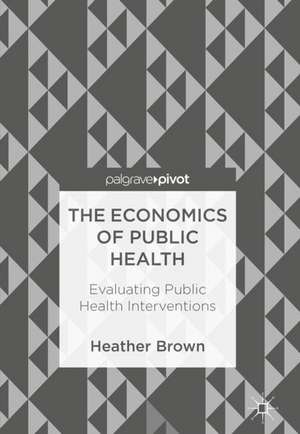The Economics of Public Health: Evaluating Public Health Interventions
Autor Heather Brownen Limba Engleză Hardback – 23 apr 2018
There are a wide range of techniques from mainstream economics and health economics that can be applied to the evaluation of public health policy and public health issues. In this book, Brown presents examples from developed countries to illustrate how economic tools can be applied to public health. Further, cross-country comparisons illustrate how contextual factors related to healthcare systems, demographics and environmental factors may impact on outcomes and the cost-effectiveness of public health policies, in order to aid understanding and help students apply theory into practice.
| Toate formatele și edițiile | Preț | Express |
|---|---|---|
| Paperback (1) | 458.12 lei 38-44 zile | |
| Springer – feb 2019 | 458.12 lei 38-44 zile | |
| Hardback (1) | 581.33 lei 6-8 săpt. | |
| Springer International Publishing – 23 apr 2018 | 581.33 lei 6-8 săpt. |
Preț: 581.33 lei
Preț vechi: 683.92 lei
-15% Nou
Puncte Express: 872
Preț estimativ în valută:
111.26€ • 115.71$ • 93.10£
111.26€ • 115.71$ • 93.10£
Carte tipărită la comandă
Livrare economică 15-29 martie
Preluare comenzi: 021 569.72.76
Specificații
ISBN-13: 9783319748252
ISBN-10: 3319748254
Pagini: 118
Ilustrații: XI, 107 p. 18 illus., 13 illus. in color.
Dimensiuni: 148 x 210 x 15 mm
Greutate: 0.35 kg
Ediția:1st ed. 2018
Editura: Springer International Publishing
Colecția Palgrave Pivot
Locul publicării:Cham, Switzerland
ISBN-10: 3319748254
Pagini: 118
Ilustrații: XI, 107 p. 18 illus., 13 illus. in color.
Dimensiuni: 148 x 210 x 15 mm
Greutate: 0.35 kg
Ediția:1st ed. 2018
Editura: Springer International Publishing
Colecția Palgrave Pivot
Locul publicării:Cham, Switzerland
Cuprins
Section 1: Introduction.- Chapter 1: Introduction to Public Health Economics.- Section 2: Data.- Chapter 2: Observational Data.- Chapter 3: Missing Data and Sample Attrition.- Section 3: Policy Evaluation.- Chapter 4: Correlations vs Causation.- Chapter 5: Before and After Study Designs.- Chapter 6: Cross-Country Comparisons.- Chapter 7: A practitioner’s guide.
Notă biografică
Heather Brown is Lecturer in Health Economics at Newcastle University, UK. She completed an MRC early career fellowship in the economics of health at the University of Aberdeen, UK. Her research interests include applied econometrics with a focus on understanding the relationship between health behaviours and outcomes and inequalities. She has published many peer reviewed publications on economics and public health.
Textul de pe ultima copertă
Non-communicable diseases have surpassed infectious diseases as the leading cause of morbidity and mortality in developed countries. Prevention and treatment of the causes and consequences of lifestyle-related diseases forms an important part of health policy in the twenty-first century. Public health economics – from quantifying the problem, to evaluating interventions and developing toolkits to assist decision makers – is an essential area for any postgraduate student and researcher with an interest in applied economics to understand.
There are a wide range of techniques from mainstream economics and health economics that can be applied to the evaluation of public health policy and public health issues. In this book, Brown presents examples from developed countries to illustrate how economic tools can be applied to public health. Further, cross-country comparisons illustrate how contextual factors related to healthcare systems, demographics and environmental factors may impacton outcomes and the cost-effectiveness of public health policies, in order to aid understanding and help students apply theory into practice.
There are a wide range of techniques from mainstream economics and health economics that can be applied to the evaluation of public health policy and public health issues. In this book, Brown presents examples from developed countries to illustrate how economic tools can be applied to public health. Further, cross-country comparisons illustrate how contextual factors related to healthcare systems, demographics and environmental factors may impacton outcomes and the cost-effectiveness of public health policies, in order to aid understanding and help students apply theory into practice.
Caracteristici
Illustrates how economic tools can improve policy evaluation and public health policy Provides a step-by-step guide on how to conduct a discrete choice experiment Highlights the shortcomings of existing outcome measures used in health economics Provides examples of health promotion interventions that include an economic component
